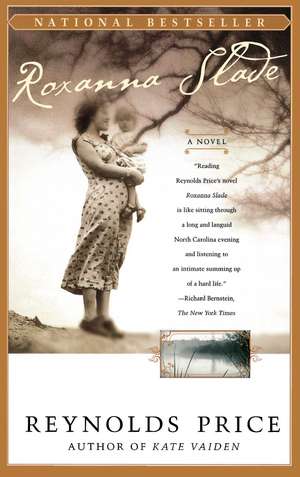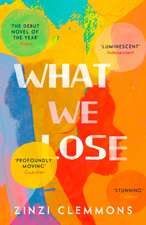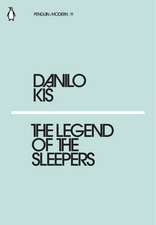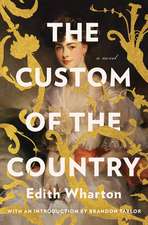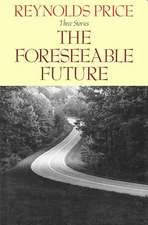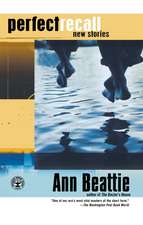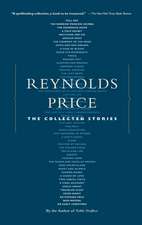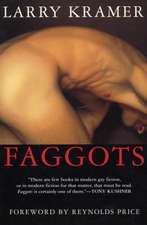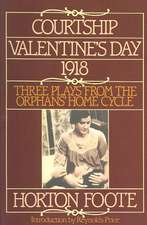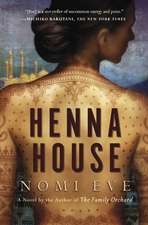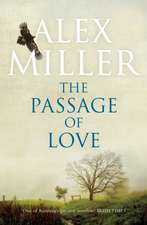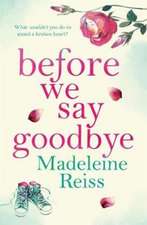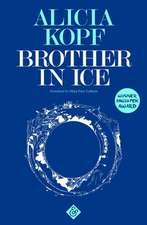Roxanna Slade: A Novel
Autor Reynolds Priceen Limba Engleză Paperback – 17 iul 2000
Preț: 121.86 lei
Nou
Puncte Express: 183
Preț estimativ în valută:
23.32€ • 24.35$ • 19.25£
23.32€ • 24.35$ • 19.25£
Carte disponibilă
Livrare economică 26 martie-09 aprilie
Preluare comenzi: 021 569.72.76
Specificații
ISBN-13: 9780684853734
ISBN-10: 0684853736
Pagini: 304
Dimensiuni: 127 x 203 x 20 mm
Greutate: 0.35 kg
Ediția:99000
Editura: Scribner
Colecția Scribner
ISBN-10: 0684853736
Pagini: 304
Dimensiuni: 127 x 203 x 20 mm
Greutate: 0.35 kg
Ediția:99000
Editura: Scribner
Colecția Scribner
Notă biografică
Reynolds Price (1933–2011) was born in Macon, North Carolina. Educated at Duke University and, as a Rhodes Scholar, at Merton College, Oxford University, he taught at Duke beginning in 1958 and was the James B. Duke Professor of English at the time of his death. His first short stories, and many later ones, are published in his Collected Stories. A Long and Happy Life was published in 1962 and won the William Faulkner Award for a best first novel. Kate Vaiden was published in 1986 and won the National Book Critics Circle Award. The Good Priest's Son in 2005 was his fourteenth novel. Among his thirty-seven volumes are further collections of fiction, poetry, plays, essays, and translations. Price is a member of both the American Academy of Arts and Letters and the American Academy of Arts and Sciences, and his work has been translated into seventeen languages.
Extras
Chapter One
Every time somebody calls me a saint, I repeat my name and tell them no saint was ever named Roxy. They know of course I was seldom called Roxy, though back in my childhood I tried to persuade my family to call me Roxy instead of the Anna which everybody chose but my brother Ferny. He'd call me Rox at least half the time and was my big favorite. For practical purposes Anna Dane was my maiden name, I never enjoyed it. Even now after so long it has never seemed to be me. Roxanna means Dawn or Daybreak which is fine, but my family never called anybody by their whole name.
So through the years I've consulted several child-naming books in hopes of discovering some good luck in Anna. But they just say the name is an English version of the Hebrew Hannah and that Hannah was the name of the prophet Samuel's mother and also Christ's maternal grandmother. Both women were likely saints, and I never felt the least kinship to either one. There was a popular song years back called "Hard-Hearted Hannah, the Vamp of Savannah, G.A." I've wished more than once she could have been me. But not one person who's ever counted deeply called me any more than nicknames, no one that is except a tall boy named Larkin Slade. And he died young, leaving me off stride for the rest of my life.
In a way Lark's death was the start of my life which is strange to think of. I was grown when he went, just barely grown. But I've given that odd fact a good deal of thought through the intervening years. Whenever I've heard about people's childhoods -- how urgent they are to future health and pleasure -- I've always felt that my childhood scarcely amounted to more than a dream, a pleasant enough dream with no grave fault, no hard stepmothers or beasts in the night but a made-up childhood all the same, certainly nothing real enough to cause the bitter pain I've since known and am bound to have given.
I had kind parents with no bad traits except my mother's tendency to put on flesh and the plug tobacco that my father chewed as neatly as any horse chews hay. They never had a great deal more money than it took to get from one day to the next. Father ran a store with groceries and dry goods that ranged from gingham to plow points but was always in dutch. Still none of us children ever went to bed hungry or lacked clean clothes sufficient to the season, and we were respected on every side.
In the kind of town where I grew up, few distinctions were made on account of money unless you were outright redheaded trash. Truth was, you were either white or black. In those days we said colored if we meant to be courteous and not hurt people, and the color of your skin pretty much said all there was to say. The Bible forbade calling anybody common (Acts X:15, "What God hath cleansed, that call not thou common"). So even if they were the sorriest white skin ever conceived, the worst you could call them was ordinary.
There were four Dane children in my generation, counting me -- two girls, two boys. It was not a big family for that day and age. I and my sister Leela were the second and third children. There was one brother two years older than I and one who was younger than both us girls. So Leela and I came very close to raising the boys once Muddie's kidneys began to fail. Muddie was our mother. That failure took long years but always kept her unreliable for bearing serious weight and pressure.
Still my brothers were good boys in those days, just normally wild before they grew up and left home naturally. How they fared after moving away is a long grim tale that may not belong here, depending on where my story leads me. Both of them perished in sad circumstances well before they deserved, one of them leaving a wife and children that I've scarcely known. But I can see each of them in my mind's eye, fine as they were in their fortunate days and prone to gentleness till they each found some drug to lose their minds for -- money in one case and pills in the other.
For instance it was through the good will of my younger brother Ferny that I met Larkin Slade and loved him on sight. Ferny had met Lark the summer I was nineteen when Fern went to work for a bachelor cousin of ours named Roscoe Dane far up on the Roanoke River, a cranky old bird who smelled like bacon and tried to cultivate rented land with insufficient help or truly good sense and was always in straits, though all of us liked him. His nearest neighbors were a family of Slades.
There was old Major Slade who'd lost half a leg and several fingers in the Civil War, his second wife Olivia who was far more beautiful than any woman since, and numerous children of all kinds and ages by each of the wives. Most of the young Slades had grown up and left with very little trace of themselves like children in old-time pioneer stories who bid you farewell and cross the far hills to vanish forever.
The Slade place had been up there way more than a century, just above the flood plain of the Roanoke when the river was wild. And though it was only eight miles from our home, Ferny stayed gone forever till Roscoe's cotton was sold in late September. When Fern got back to us in time to start his last year of school, he was browner than any walnut chair. And very nearly all he could offer by way of memory from a long summer's work was praise for somebody named Larkin Slade.
Lark Slade deserved all the praise he got, as I soon learned thanks to Ferny's good-hearted descriptions. My birthday falls on October 8th, and on the year in question -- 1920 -- I was blue for several causes as the date drew near. My sister Leela had fallen out with me for fairly normal sisterly reasons having to do with a blouse we shared. We'd spent too many years in each other's faces, and Muddie had taken my sister's side as she generally did. In those days in any case there were so many souls in every family that you never made much of any birthday even if you were well off, so I had no great hopes for my twentieth.
Then on October 7th when Ferny had been back at home for a few weeks, he walked in from the post office with a card addressed in a strong man's hand and called me aside to whisper a plan. "Let's give this whole bunch a big damned surprise." Fern always called our family this whole bunch. Then he said we could "borrow" Father's car before sunrise and motor up to Larkin's place for the day. Tomorrow would be Friday. Ferny had shaved Friday off more school weeks than not, and I didn't try to object on those grounds. Anyhow he flashed the postcard to show me Lark's signature. It looked like the map of splendid distant mountains.
I recalled Father never used the car on week days. Muddie couldn't have driven a goat cart in a crisis, much less a car. And since nobody then paid a scrap of attention to a driver's license, Ferny stole the car several times a year. He could start the Model T under water if called upon; and he'd run off with it and two especially ordinary girls the previous spring, staying nearly a week and requiring a hunt by the sheriff to find.
"It'll drive them all crazy," Fern said to tempt me. He was smiling down strongly at Lark Slade's postcard. By them Fern meant our family of course, and of course he was right. He and I were mostly the troublemakers, though the troubles were slight by comparison with any family's now.
I doubted Fern knew my birthday was coming that very next day. I chose not to tell him. I just nodded and smiled and said I'd be ready.
I could still make choices at a moment's notice, and seeing two things had made me say Yes -- the mischief in Ferny's bright copper-brown eyes and the sight of Larkin Slade's whole name in his own rushing hand. Old as I was, and more than half of all girls near twenty then were married, I ought to have smelled the danger before us. I was old enough not to join my brother's foolishness and trick our father, a peaceful soul. I very well knew Ferny always overreached. But even a girl about to turn twenty -- me, an earnest creature who took duty seriously -- couldn't sense death coming on a cool fall day.
Copyright © 1998 by Reynolds Price
Every time somebody calls me a saint, I repeat my name and tell them no saint was ever named Roxy. They know of course I was seldom called Roxy, though back in my childhood I tried to persuade my family to call me Roxy instead of the Anna which everybody chose but my brother Ferny. He'd call me Rox at least half the time and was my big favorite. For practical purposes Anna Dane was my maiden name, I never enjoyed it. Even now after so long it has never seemed to be me. Roxanna means Dawn or Daybreak which is fine, but my family never called anybody by their whole name.
So through the years I've consulted several child-naming books in hopes of discovering some good luck in Anna. But they just say the name is an English version of the Hebrew Hannah and that Hannah was the name of the prophet Samuel's mother and also Christ's maternal grandmother. Both women were likely saints, and I never felt the least kinship to either one. There was a popular song years back called "Hard-Hearted Hannah, the Vamp of Savannah, G.A." I've wished more than once she could have been me. But not one person who's ever counted deeply called me any more than nicknames, no one that is except a tall boy named Larkin Slade. And he died young, leaving me off stride for the rest of my life.
In a way Lark's death was the start of my life which is strange to think of. I was grown when he went, just barely grown. But I've given that odd fact a good deal of thought through the intervening years. Whenever I've heard about people's childhoods -- how urgent they are to future health and pleasure -- I've always felt that my childhood scarcely amounted to more than a dream, a pleasant enough dream with no grave fault, no hard stepmothers or beasts in the night but a made-up childhood all the same, certainly nothing real enough to cause the bitter pain I've since known and am bound to have given.
I had kind parents with no bad traits except my mother's tendency to put on flesh and the plug tobacco that my father chewed as neatly as any horse chews hay. They never had a great deal more money than it took to get from one day to the next. Father ran a store with groceries and dry goods that ranged from gingham to plow points but was always in dutch. Still none of us children ever went to bed hungry or lacked clean clothes sufficient to the season, and we were respected on every side.
In the kind of town where I grew up, few distinctions were made on account of money unless you were outright redheaded trash. Truth was, you were either white or black. In those days we said colored if we meant to be courteous and not hurt people, and the color of your skin pretty much said all there was to say. The Bible forbade calling anybody common (Acts X:15, "What God hath cleansed, that call not thou common"). So even if they were the sorriest white skin ever conceived, the worst you could call them was ordinary.
There were four Dane children in my generation, counting me -- two girls, two boys. It was not a big family for that day and age. I and my sister Leela were the second and third children. There was one brother two years older than I and one who was younger than both us girls. So Leela and I came very close to raising the boys once Muddie's kidneys began to fail. Muddie was our mother. That failure took long years but always kept her unreliable for bearing serious weight and pressure.
Still my brothers were good boys in those days, just normally wild before they grew up and left home naturally. How they fared after moving away is a long grim tale that may not belong here, depending on where my story leads me. Both of them perished in sad circumstances well before they deserved, one of them leaving a wife and children that I've scarcely known. But I can see each of them in my mind's eye, fine as they were in their fortunate days and prone to gentleness till they each found some drug to lose their minds for -- money in one case and pills in the other.
For instance it was through the good will of my younger brother Ferny that I met Larkin Slade and loved him on sight. Ferny had met Lark the summer I was nineteen when Fern went to work for a bachelor cousin of ours named Roscoe Dane far up on the Roanoke River, a cranky old bird who smelled like bacon and tried to cultivate rented land with insufficient help or truly good sense and was always in straits, though all of us liked him. His nearest neighbors were a family of Slades.
There was old Major Slade who'd lost half a leg and several fingers in the Civil War, his second wife Olivia who was far more beautiful than any woman since, and numerous children of all kinds and ages by each of the wives. Most of the young Slades had grown up and left with very little trace of themselves like children in old-time pioneer stories who bid you farewell and cross the far hills to vanish forever.
The Slade place had been up there way more than a century, just above the flood plain of the Roanoke when the river was wild. And though it was only eight miles from our home, Ferny stayed gone forever till Roscoe's cotton was sold in late September. When Fern got back to us in time to start his last year of school, he was browner than any walnut chair. And very nearly all he could offer by way of memory from a long summer's work was praise for somebody named Larkin Slade.
Lark Slade deserved all the praise he got, as I soon learned thanks to Ferny's good-hearted descriptions. My birthday falls on October 8th, and on the year in question -- 1920 -- I was blue for several causes as the date drew near. My sister Leela had fallen out with me for fairly normal sisterly reasons having to do with a blouse we shared. We'd spent too many years in each other's faces, and Muddie had taken my sister's side as she generally did. In those days in any case there were so many souls in every family that you never made much of any birthday even if you were well off, so I had no great hopes for my twentieth.
Then on October 7th when Ferny had been back at home for a few weeks, he walked in from the post office with a card addressed in a strong man's hand and called me aside to whisper a plan. "Let's give this whole bunch a big damned surprise." Fern always called our family this whole bunch. Then he said we could "borrow" Father's car before sunrise and motor up to Larkin's place for the day. Tomorrow would be Friday. Ferny had shaved Friday off more school weeks than not, and I didn't try to object on those grounds. Anyhow he flashed the postcard to show me Lark's signature. It looked like the map of splendid distant mountains.
I recalled Father never used the car on week days. Muddie couldn't have driven a goat cart in a crisis, much less a car. And since nobody then paid a scrap of attention to a driver's license, Ferny stole the car several times a year. He could start the Model T under water if called upon; and he'd run off with it and two especially ordinary girls the previous spring, staying nearly a week and requiring a hunt by the sheriff to find.
"It'll drive them all crazy," Fern said to tempt me. He was smiling down strongly at Lark Slade's postcard. By them Fern meant our family of course, and of course he was right. He and I were mostly the troublemakers, though the troubles were slight by comparison with any family's now.
I doubted Fern knew my birthday was coming that very next day. I chose not to tell him. I just nodded and smiled and said I'd be ready.
I could still make choices at a moment's notice, and seeing two things had made me say Yes -- the mischief in Ferny's bright copper-brown eyes and the sight of Larkin Slade's whole name in his own rushing hand. Old as I was, and more than half of all girls near twenty then were married, I ought to have smelled the danger before us. I was old enough not to join my brother's foolishness and trick our father, a peaceful soul. I very well knew Ferny always overreached. But even a girl about to turn twenty -- me, an earnest creature who took duty seriously -- couldn't sense death coming on a cool fall day.
Copyright © 1998 by Reynolds Price
Recenzii
Richard Bernstein The New York Times Reading Reynolds Price's novel Roxanna Slade is like sitting through a long and languid North Carolina evening and listening to an intimate summing up of a hard life.
Diana Postlethwaite The Washington Post Reading Roxanna Slade is like sitting at the feet of the wisest, most engaging, truth-tellingest grandmother imaginable....Here is language you can swim in, inhale, savor on the tip of your tongue.
David Weigand San Francisco Chronicle Roxanna Slade is a profoundly and provocatively hope-filled book -- one might even say spiritual....Masterful...compelling.
Charles Frazier author of Cold Mountain What a privilege to sit down with this book and let Roxanna Slade's wise, strong voice talk in your mind for a measure of hours about the profound consequence of ordinary lives.
James Schiff The Raleigh News & Observer A virtuoso performance...through Roxanna's voice Price demonstrates that he, more than any of his contemporaries, is indeed a singer of stories.
Janet Burroway The New York Times Book Review A chronicler of decency, pluck and joy, in novel after novel [Price] has given us the weight and worth of the ordinary.
Ellen Kanner The Miami Herald Roxanna Slade shows that in a world of deceit, a simple, good woman is something exceptional. She can tell a good story if you have the time to listen.
Barbara Holliday Detroit Free Press Reynolds Price may well be the dean of Southern writers.
Anne Rivers Siddons Extraordinary. Price knows all there is to know about the American South, and Roxanna Slade is what he knows. It's a powerful book in its deceptive simplicity, vivid and particular. I loved it.
Polly Paddock Gossett The Charlotte Observer Price proves yet again why he is one of America's most esteemed writers. His prose is rich and lyrical; his insights keen; his ability to slip inside the skin of his characters (especially women) astounding.
Diana Postlethwaite The Washington Post Reading Roxanna Slade is like sitting at the feet of the wisest, most engaging, truth-tellingest grandmother imaginable....Here is language you can swim in, inhale, savor on the tip of your tongue.
David Weigand San Francisco Chronicle Roxanna Slade is a profoundly and provocatively hope-filled book -- one might even say spiritual....Masterful...compelling.
Charles Frazier author of Cold Mountain What a privilege to sit down with this book and let Roxanna Slade's wise, strong voice talk in your mind for a measure of hours about the profound consequence of ordinary lives.
James Schiff The Raleigh News & Observer A virtuoso performance...through Roxanna's voice Price demonstrates that he, more than any of his contemporaries, is indeed a singer of stories.
Janet Burroway The New York Times Book Review A chronicler of decency, pluck and joy, in novel after novel [Price] has given us the weight and worth of the ordinary.
Ellen Kanner The Miami Herald Roxanna Slade shows that in a world of deceit, a simple, good woman is something exceptional. She can tell a good story if you have the time to listen.
Barbara Holliday Detroit Free Press Reynolds Price may well be the dean of Southern writers.
Anne Rivers Siddons Extraordinary. Price knows all there is to know about the American South, and Roxanna Slade is what he knows. It's a powerful book in its deceptive simplicity, vivid and particular. I loved it.
Polly Paddock Gossett The Charlotte Observer Price proves yet again why he is one of America's most esteemed writers. His prose is rich and lyrical; his insights keen; his ability to slip inside the skin of his characters (especially women) astounding.
Descriere
In ROXANNA SLADE, Reynolds Price creates an unforgettable character possessed of intensely clear vision, forthright hungers, and immense vitality.
